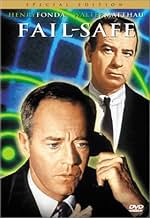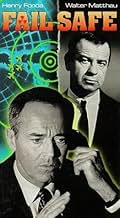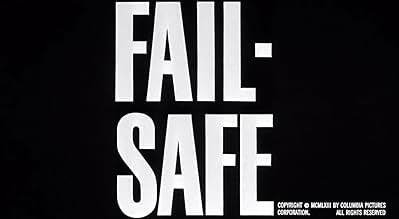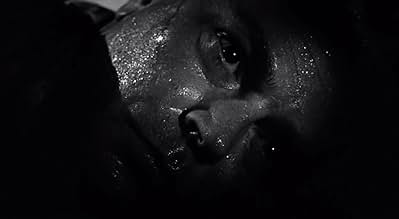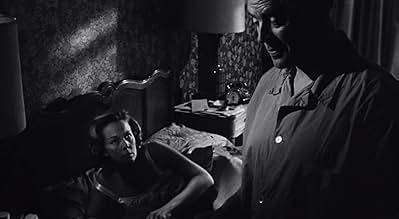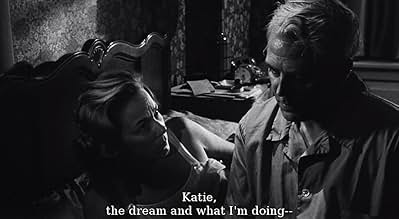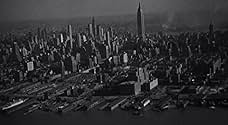IMDb-BEWERTUNG
8,0/10
25.448
IHRE BEWERTUNG
Aufgrund eines technischen Fehlers erhalten amerikanische Flugzeuggeschwader den Befehl, über Moskau Atombomben abzuwerfen. Kann ein absoluter Vernichtungskrieg abgewendet werden?Aufgrund eines technischen Fehlers erhalten amerikanische Flugzeuggeschwader den Befehl, über Moskau Atombomben abzuwerfen. Kann ein absoluter Vernichtungskrieg abgewendet werden?Aufgrund eines technischen Fehlers erhalten amerikanische Flugzeuggeschwader den Befehl, über Moskau Atombomben abzuwerfen. Kann ein absoluter Vernichtungskrieg abgewendet werden?
- Nominiert für 1 BAFTA Award
- 3 Nominierungen insgesamt
Dom DeLuise
- Sgt. Collins
- (as Dom DeLouise)
Handlung
WUSSTEST DU SCHON:
- WissenswertesThe "computer-generated" image on the control-room screen (including the map of the world, the planes and the explosions) was entirely drawn and animated by hand.
- PatzerThe end credits list General Black's wife as Betty, but in the film he addresses her as Katie and in a radio conversation, the President asks Black, "Are Kathryn and the kids in New York?"
- Zitate
US Ambassador: [over the phone] I can hear the sound of explosions from the north east. The sky is very bright. All lit up.
[phone melts and high pitched whining sound starts]
- Crazy Credits[FINAL CREDIT]: The producers of this film wish to stress that it is the stated position of the Department of Defense and the United States Air Force that a rigidly enforced system of safeguards and controls insure that occurrences such as those depicted in this story cannot happen
- VerbindungenFeatured in Henry Fonda: The Man and His Movies (1982)
Ausgewählte Rezension
I mentioned in another comment about a series of movies made during the mid-1960's, that I call 'political noir'.
These films are easy to spot, in that there were made in B&W, dealt with a American institutional crisis and seemed to always feature Henry Fonda somewhere in the cast.
On all three counts, this film fits that criteria.
Because this film came out around the time of "Dr Strangelove", it was somewhat overshadowed, and because of the nearly identical plots, there was even talk of plagiarism, even though this film was based on a novel by two Washington-based journalists with a remarkable insight of the workings of government and was directed by Sidney Lument, one of the cinema's great directors.
Also, unlike "Dr Strangelove", which seemed to receive major studio backing, money and the freedom offered by being produced in Great Britain where this satire was more appreciated, "Fail-Safe" was independently produced in New York on a limited budget, without official backing by the Defense Department, which explains all of the flaws complained of by many viewers and posters on this site.
Yet in spite of these limitations, Lument pulls off a major coup by presenting us with an authentic piece of Armeggeddon.
In a real-time view, we watch as a million-to-one technical fault 'orders' a wing of American bombers to attack Soviet Russia, and the Defense Department and the President are helpless in trying to stop it.
We are also witness to how our military operates, trying to plan military policy, and debating theory and possible results.
Such things are sensible and harmless as far as these things go, until 'the day comes' when reality displaces theory.
Walter Matthau, who is more well-known for his comic talents ("The Odd Couple", "Grumpy Old Men"), than being an accomplished dramatic actor, is shown at the height of his powers as Prof. Groteschelle; a defense policy wonk, whose obsession with defense preparedness and Marxist theory reaches the point of detachment from human emotion, as he blindly recommends that no action be taken and the bombers be allowed to complete their mission, resulting in 'final victory' over Communism.
This is in direct contradiction to General Black, a compassionate Air Force officer who is also an intellectual, who desperately urges that every means be made to stop the bombers before it is too late.
However, it turns out to be too late, at least on the American side.
We watch how technology becomes a hindrance, as much as the distrust between the two superpowers seems to be, as the President and the Soviet Premier desperately try to seek a solution to this disaster.
The tragedy about this is that someone thought they should remake this in 2000, which in a way is flattering but certainly could not come close to the original work.
But, this only proves that the subject of 'accidental war' is still a concern.
However, how can one do better than Henry Fonda ???
These films are easy to spot, in that there were made in B&W, dealt with a American institutional crisis and seemed to always feature Henry Fonda somewhere in the cast.
On all three counts, this film fits that criteria.
Because this film came out around the time of "Dr Strangelove", it was somewhat overshadowed, and because of the nearly identical plots, there was even talk of plagiarism, even though this film was based on a novel by two Washington-based journalists with a remarkable insight of the workings of government and was directed by Sidney Lument, one of the cinema's great directors.
Also, unlike "Dr Strangelove", which seemed to receive major studio backing, money and the freedom offered by being produced in Great Britain where this satire was more appreciated, "Fail-Safe" was independently produced in New York on a limited budget, without official backing by the Defense Department, which explains all of the flaws complained of by many viewers and posters on this site.
Yet in spite of these limitations, Lument pulls off a major coup by presenting us with an authentic piece of Armeggeddon.
In a real-time view, we watch as a million-to-one technical fault 'orders' a wing of American bombers to attack Soviet Russia, and the Defense Department and the President are helpless in trying to stop it.
We are also witness to how our military operates, trying to plan military policy, and debating theory and possible results.
Such things are sensible and harmless as far as these things go, until 'the day comes' when reality displaces theory.
Walter Matthau, who is more well-known for his comic talents ("The Odd Couple", "Grumpy Old Men"), than being an accomplished dramatic actor, is shown at the height of his powers as Prof. Groteschelle; a defense policy wonk, whose obsession with defense preparedness and Marxist theory reaches the point of detachment from human emotion, as he blindly recommends that no action be taken and the bombers be allowed to complete their mission, resulting in 'final victory' over Communism.
This is in direct contradiction to General Black, a compassionate Air Force officer who is also an intellectual, who desperately urges that every means be made to stop the bombers before it is too late.
However, it turns out to be too late, at least on the American side.
We watch how technology becomes a hindrance, as much as the distrust between the two superpowers seems to be, as the President and the Soviet Premier desperately try to seek a solution to this disaster.
The tragedy about this is that someone thought they should remake this in 2000, which in a way is flattering but certainly could not come close to the original work.
But, this only proves that the subject of 'accidental war' is still a concern.
However, how can one do better than Henry Fonda ???
- pizzawarrior1956-1
- 27. Nov. 2005
- Permalink
Top-Auswahl
Melde dich zum Bewerten an und greife auf die Watchlist für personalisierte Empfehlungen zu.
Details
- Erscheinungsdatum
- Herkunftsland
- Sprachen
- Auch bekannt als
- Límite de seguridad
- Drehorte
- Westbury, Long Island, New York, USA(Roosevelt Field: President's bunker)
- Produktionsfirma
- Weitere beteiligte Unternehmen bei IMDbPro anzeigen
Box Office
- Bruttoertrag in den USA und Kanada
- 3.924.000 $
- Laufzeit1 Stunde 52 Minuten
- Farbe
- Seitenverhältnis
- 1.85 : 1
Zu dieser Seite beitragen
Bearbeitung vorschlagen oder fehlenden Inhalt hinzufügen


![Trailer [OV] ansehen](https://m.media-amazon.com/images/M/MV5BZjExYTg4YzctNGIwZC00ZWUwLWFhOWItNTJhYjRiY2UzZjk4XkEyXkFqcGdeQXRyYW5zY29kZS13b3JrZmxvdw@@._V1_QL75_UX500_CR0)
